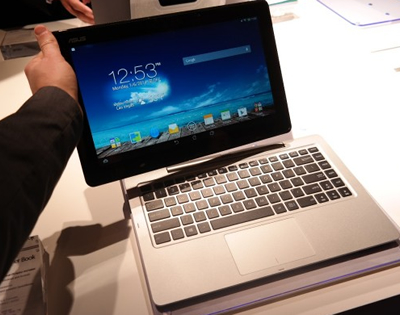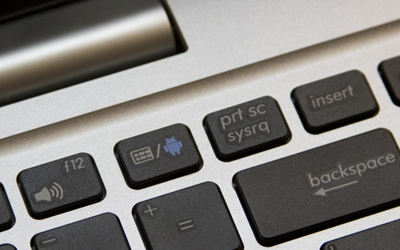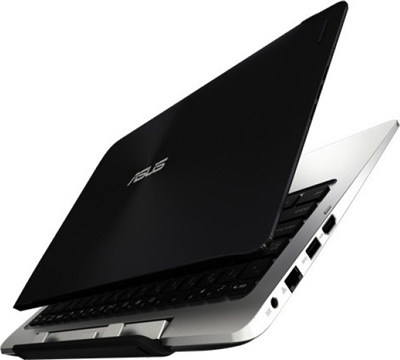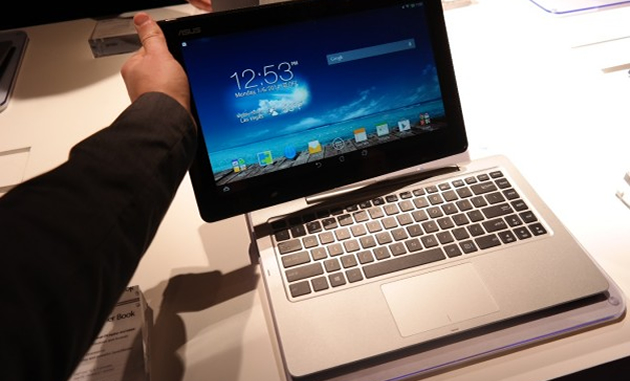Do you love Android apps, but also need Windows and its standard productivity software? Wish there was a device that offered both Android and Windows? Now there is: the Transformer Book Duet TD300, a 13.3 inch laptop-tablet hybrid that Asus announced at the Consumer Electronics Show (CES) this week.
 The Book Duet’s specs range from mid-range “meh” to high-end hotness. To keep costs and weight down, Asus has enclosed this tablet in plastic rather than metal, and some reviewers thought that the plastic felt cheap and hollow. For the 13.3-inch, multi-touch screen, you’ll be able to choose between a 1920 x 1080 full HD display or cheaper 1,366 x 768 resolution display, starting at $599. You can also choose an Intel Core i3, i5 or i7 processor with 4G of 1600MHz RAM, and 64GB or 128GB of SSD storage, plus there’s a microSD card slot for adding up to 64GB of external storage. The keyboard dock houses a 1TB hard drive, USB 3.0 and USB 2.0 ports, a LAN port, and HDMI output.
The Book Duet’s specs range from mid-range “meh” to high-end hotness. To keep costs and weight down, Asus has enclosed this tablet in plastic rather than metal, and some reviewers thought that the plastic felt cheap and hollow. For the 13.3-inch, multi-touch screen, you’ll be able to choose between a 1920 x 1080 full HD display or cheaper 1,366 x 768 resolution display, starting at $599. You can also choose an Intel Core i3, i5 or i7 processor with 4G of 1600MHz RAM, and 64GB or 128GB of SSD storage, plus there’s a microSD card slot for adding up to 64GB of external storage. The keyboard dock houses a 1TB hard drive, USB 3.0 and USB 2.0 ports, a LAN port, and HDMI output.
If the Transformer Book Duet sounds like your kind of laptop-tablet, then check out some of the best hands-on previews we’ve rounded up for you below:
Android Police (with video):
“On the performance size, the Duet is full-on beastly in Android. This is, of course, thanks to Intel’s Haswell-based Core chips, which maxed out the benchmark. …It’s crazy fast. Once everything is booted up and ready to go, switching between Android and Windows takes about four seconds.”
 Ars Technica:
Ars Technica:
“This is a feature that will only appeal to a certain subset of enthusiasts. There’s too much awkwardness and potential for confusion around the switching mechanism otherwise.”
CNET (with video):
“Though the dual-OS packing convertible tablet is an impressive release, the tablet has a few downsides. It runs an older version of Android (4.1) and, with the dock, it’s a thick and hefty package. Also, the Duet’s 1,920 x 1,080 pixel resolution is a far cry from the super-high resolution other CES-debuting slates are rocking.”
Engadget (with video):
“Although the display doesn’t have the best pixel density (1,366 x 768 resolution to start), it offers wide viewing angles — just like most other ASUS laptops we’ve tested, come to think of it. All told, the screen stands up well to the harsh overhead lighting at ASUS’s Las Vegas press event, which seems like a good early test.”
 Laptop Magazine (with video):
Laptop Magazine (with video):
“It remains to be seen whether consumers will be excited or confused by a device that runs both Android and Windows, but we’re in the former camp. It will all come down to the execution. The Transformer Book Duet definitely looks like the hybrid to watch for 2014.”
PC Advisor:
“The device seems a little too cumbersome to be used as a convertible device as it’s intended to be, meaning that users are only really going to use it in the laptop mode, making half of the Transformer Book Duet TD300 virtually redundant.”
Trusted Reviews:
“Its headline price doesn’t reflect the version of the product we’d want to own, and even at its full spec it won’t feel as impressive as an aluminium or magnesium Ultrabook. However, the ease with which the TD300 switches between Android and Windows is impressive. And while many will dismiss this as a solution to a non-existent problem, the idea of being able to take off your laptop’s screen to watch or play on the sofa or in bed isn’t a bad one.”





